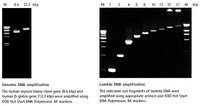| Elena Curti, Stephen J. Smerdon and Elaine O. Davis. (2007) Characterization of the helicase activity and substrate specificity of Mycobacterium tuberculosis UvrD. Journal of Bacteriology 189, 1542-1555.
R. Guerrini, et al. (2007) Expansion of the first PolyA tract of ARX causes infantile spasms and status dystonicus. Neurology 69, 427-433.
Changkeun Lee, et al. (2007) Yeast mitochondrial initiator tRNA is methylated at G37 by the TRM5-encoded tRNA (Guanine-N1-)-methyltransferase. Journal of Biological Chemistry 282, 27744-27753.
Bin Li, et al. (2007) FOXP3 interactions with histone acetyltransferase and class II histone deacetylases are required for repression. Procedings of the National Academy of Science 104, 4571-4576.
Michael T. McIntosh, et al. (2007) Traffic to the malaria parasite food vacuole: A novel pathway involving a PI3P binding protein. Journal of Biological Chemistry 282, 11499-11508.
Anna K. Overby, Ralf F. Pettersson and Etienne P. A. Neve. (2007) The Glycoprotein Cytoplasmic Tail of Uukuniemi Virus (Bunyaviridae) Interacts with Ribonucleoproteins and Is Critical for Genome Packaging. Journal of Virology 81, 3198-3205.
Ken-ichiro Taoka, et al. (2007) Reciprocal phosphorylation and glycosylation recognition motifs control NCAPP1 interaction with pumpkin phloem proteins and their cell-to-cell movement. Plant Cell 19, 1866-1884.
David M. Cauvi, Gabrielle Cauvi and K. Michael Pollard. (2006) Constitutive expression of murine decay-accelerating factor 1 is controlled by the transcription factor Sp1. Journal of Immunology 177, 3837-3847.
Lata T. Gooljarsingh, et al. (2006) A biochemical rationale for the anticancer effects of Hsp90 inhibitors: Slow, tight binding inhibition by geldanamycin and its analogues. Proceedings of the National Academy of Sciences (USA) 103, 7625-7630.
Lijoy K. Mathew, Eric A. Andreasen and Robert L. Tanguay. (2006) Aryl hydrocarbon receptor activation inhibits regenerative growth. Molecular Pharmacology 69, 257-265.
Sambit K. Nanda and Michael D. Baron. (2006) Rinderpest virus blocks type I and type II interferon action: role of structural and nonstructural proteins. Journal of Virology 80, 7555-7568.
Motoko Unoki, et al. (2006) Novel splice variants of ING4 and their possible roles in regulation of cell growth and motility. Journal of Biological Chemistry 281, 34677-34686.
Brock F. Binkowski, et al. (2005) Correcting errors in synthetic DNA through consensus shuffling. Nucleic Acids Research 33, e66.
Sean Crosson, et al. (2005) Conserved modular design of an oxygen sensory/signaling network with species-specific output. Proceedings of the National Academy of Sciences (USA) 102, 8018-8023.
Kathryn H. Loomis, et al. (2005) InsectDirectTM System: rapid, high-level protein expression and purication from insect cells. Journal of Structural and Functional Genomics 6, 189-194.
Oliver Schilling, et al. (2005) Exosite modules guide substrate recognition in the ZiPD/ElaC protein family. Journal of Biological Chemistry 280, 17857-17862.
Marko Tammenkoski, et al. (2005) An unusual, his-dependent family I pyrophosphatase from Mycobacterium tuberculosis. Journal of Biological Chemistry 280, 41819-41826.
Mark E. Williams, et al. (2005) Ric-3 promotes functional expression of the nicotinic acetylcholine receptor 7 subunit in mammalian cells. Journal of Biological Chemistry 280, 1257-1263.
Jean-Francois Rual, et al. (2004) Human ORFeome version 1.1: a platform for reverse proteomics. Genome Research 14, 2128-2135.
Xinxin Gao, et al. (2003) Thermodynamically balanced inside-out (TBIO) PCR-based gene synthesis: a novel method of primer design for high-fidelity assembly of longer gene sequences. Nucleic Acids Research 31, e143-.
Tomoko Miyazato, et al. (2003) Molecular analysis of VcfQ protein involved in Vibrio cholerae type IV pilus biogenesis. Medical Microbiology 52, 283-288.
Takaaki Sato, et al. (2003) Targeted gene disruption by homologous recombination in the hyperthermophilic Archaeon Thermococcus kodakaraensis KOD1. Journal of Bacteriology 185, 210-220.
Yoshihiko Hirohashi, et al. (2002) An HLA-A24-restricted cytotoxic T lymphocyte epitope of a tumor-associated protein, survivin. Clinical Cancer Research 8, 1731-1739.
Takeshi Okamoto, et al. (2002) A change in PBP1 is involved in amoxicillin resistance of clinical isolates of Helicobacter pylori. Journal of Antimicrobial Chemotherapy 50, 849-856.
Mitsuaki Tabuchi, et al. (2002) Alternative splicing regulates the subcellular localization of divalent metal transporter 1 isoforms. Molecular Biology of the Cell 13, 4371-4387.
Harumi Terasaki, et al. (2002) Frizzled-10, up-regulated in primary colorectal cancer, is a positive regulator of the WNT-β-catenin-TCF signaling pathway. International Journal of Molecular Medicine 9, 107-112.
Masaki Watanabe, et al. (2002) Molecular characterization of a novel β1,3-galactosyltransferase for capsular polysaccharide synthesis by Streptococcus agalactiae type Ib. 131, 183-191.
Tokinori Iwamotob, et al. (2001) Establishment of an infectious RNA transcription system for striped jack nervous necrosis virus, the type species of the betanodaviruses. Journal of General Virology 82, 2653-2662.
Naoki Matsumoto, et al. (2001) H-2 allele specificity of the NK cell C-type lectin-like MHC class I receptor Ly49A visualized by soluble Ly49A tetramer. International Immunology 13, 615-623.
Naoki Matsumotoa, et al. (2001) The functional binding site for the C-type lectin-like natural killer cell receptor Ly49A spans three domains of its major histocompatibility complex class I ligand. Journal of Experimental Medicine 193, 147-158.
Norihiko Sagara and Masaru Katoh. (2000) Mitomycin C resistance induced by TCF-3 overexpression in gastric cancer cell line MKN28 is associated with DT-diaphorase down-regulation. Cancer Research 60, 5959-5962.
|
|









